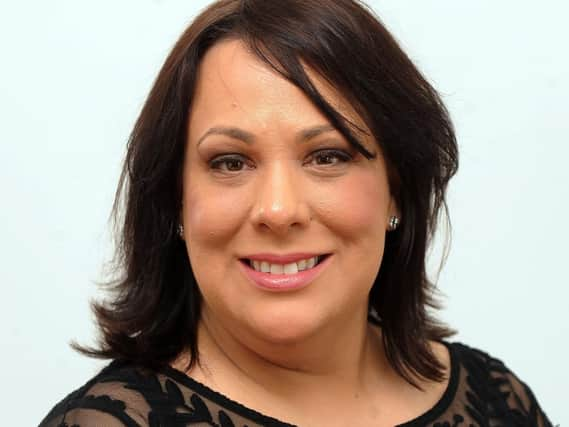Former Dewsbury MP Paula Sherriff hails her medical team as she marks a year since being told she was free of breast cancer


Paula Sherriff, who was elected as Labour MP for Dewsbury in 2015, was diagnosed with a rare form of breast cancer aged 44 just 11 weeks after losing her seat in 2019’s General Election.
She underwent a mastectomy and radiotherapy during the first wave of the pandemic last year before being told by her surgeon, Mr Ravi Sowdi, at Pinderfields Hospital in Wakefield that she was cancer-free last May and now wants to raise awareness of breast cancer symptoms amid the NHS seeing lower referrals during the pandemic.
Advertisement
Hide AdAdvertisement
Hide AdMs Sherriff was diagnosed after finding a painful patch of skin on her collarbone, and on the day she went to Pinderfields to have it looked at, she drove to the hospital with the Budget on the radio and heard Chancellor Rishi Sunak pay tribute to her work on period poverty.
She said: “It was really kind of him - I remember laughing to myself at the irony of driving to the appointment.”
Although initial assessments by a doctor at the hospital didn’t flag significant concerns, Paula later found out she had a tumour on her breast during a mammogram.
Speaking about her diagnosis, she said: “The first thing I said when they told me it was cancer was ‘I don’t want to die.’
Advertisement
Hide AdAdvertisement
Hide Ad“I’m sure staff hear that a lot, but cancer is such a loaded word.”
The former MP, now 46, was initially told her breast may not have needed to be removed, but further tests showed the need for the mastectomy.
She said: “My final appointment before the surgery was with Mr Sowdi and he was just wonderful. He put me at ease and was so invested in my care.
“On the day of the operation, I remember going in on my own. I was crying, it just felt horrible. I had a huge fear of anaesthetic, I was terrified.
“Mr Sowdi came to see me and put my mind at rest.
Advertisement
Hide AdAdvertisement
Hide Ad“I had to focus on the fact they were removing this alien from my body. It was really weird because the anaesthetic staff were in space suits. I’ve had operations before, and it just felt really strange. Next thing I woke up, and they told me it had gone.
“All the staff were wonderful.”
Tests on Ms Sherriff’s tumour showed that chemotherapy would not be an appropriate treatment, but she later underwent a course of radiotherapy at St James’ Hospital in Leeds, before being given the news that she was in remission from the disease.
Ms Sherriff was faced with the difficulties of being treated for cancer during the pandemic - from not being able to take a friend with her to appointments to having to supply her own bell to ring in the tradition that marks the end of treatment as the ward bell had been removed due to covid.
She is now determined to ensure other women worried they have cancer symptoms do not let the pandemic deter them from being checked.
Advertisement
Hide AdAdvertisement
Hide AdShe said: “Get that peace of mind. The success rates for curing breast cancer now is amazing, and it’s not worth the risk. You musn’t be embarrassed.
“It could be the difference between life and death. Hospitals have told me their referral rates have been significantly reduced and they’re worrying about what that means. I’m so glad I got myself checked. I might be dying right now if I hadn’t.”
Trudie Davies, Chief Operating Officer, at the Mid Yorkshire Hospitals NHS Trust said: “We are delighted that Paula has made such a great recovery following her diagnosis.
“It is so important that women get checked out if they notice anything unusual, as early diagnosis and treatment of cancer is crucial to ensuring that others, like Paula, can benefit from the improvements made in cancer outcomes"